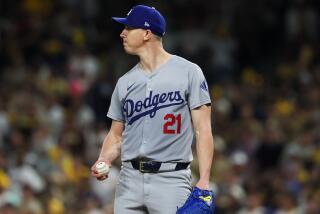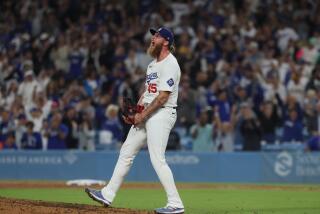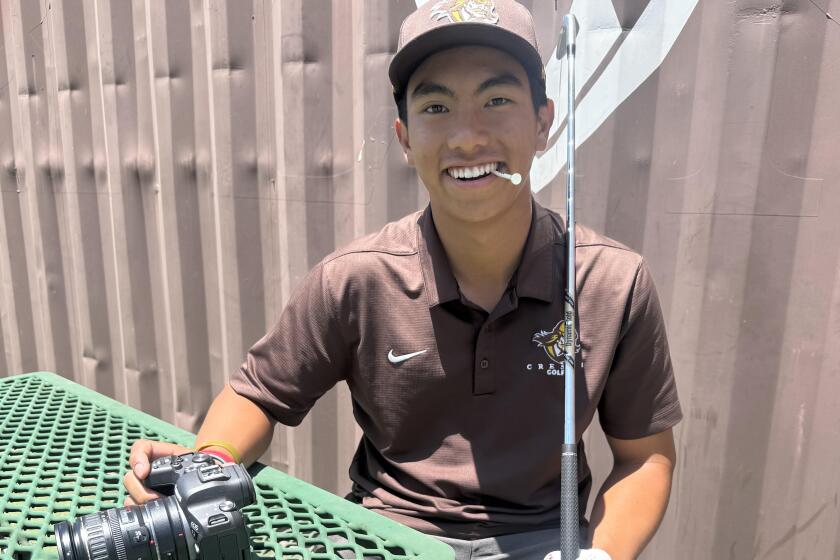Hailing Cesar, Whose Fame Is a Two-Sided Issue
- Share via
The routine will be no different for Cesar Izturis in today’s playoff opener in St. Louis than it has been in Los Angeles and every National League city.
He will stand in front of the dugout during the national anthem, bow his head and quietly pray for the safety of his family in Venezuela, where the unrest is punctuated by gunfire and where the recent kidnapping of Detroit closer Ugueth Urbina’s mother remains unresolved.
“I pray for my family, my country and Urbina’s mother,” the Dodger shortstop was saying before the departure for Missouri. “I pray God will help us. Every year it is more dangerous in my country. I have my job and I try to move on, but it is always there and very hard for me.”
Hard, indeed, but who would know it? With the cellphone as his lifeline, cutting through the distance and distraction, little Cesar has continued to prove he is big enough to have his heart in two places at once.
In Venezuela, where his parents, Cesar and Elidez, and five brothers live.
And in Los Angeles, where his wife, Liliana, and son, Cesar, share and comfort his homeland concerns and where he has turned golden before our eyes:
Consistent and, at times, dazzling on defense, productive now from both sides of the plate, his maturation and contribution have been as vital to an improbable division title as that of Adrian Beltre, and a potentially lasting legacy from Dan Evans’ brief tenure as general manager.
“Am I proud of Cesar’s development?” Evans said by phone. “Absolutely. The Dodgers needed to get out of a policy of transient shortstops, and Cesar was our first real piece in trying to restore a philosophy of pitching and defense.”
In what turned out to be a steal, Evans acquired Izturis, then 21, and the resilient Paul Quantrill from Toronto for pitchers Luke Prokopec and Chad Ricketts on Dec. 13, 2001.
At the time, said Evans, “we had no financial flexibility and were restricted [by then-chairman Bob Daly] from moving any of our young pitching to take on payroll. The fact Cesar was making the minimum was a key, but we also had done a lot of research. The consensus opinion was that he had the incredible instincts of a young Omar Vizquel and Ozzie Guillen.”
Now?
“I think he’s one of the best in the league and one of the best in the history of the club,” Evans said, “and he’s still a kid [at 24] with a chance to get better.”
The history of the club includes a shortstop relay (with some interruptions) of Pee Wee Reese to Maury Wills to Bill Russell, whose 1986 departure triggered that transient parade.
Thirty-seven players have appeared at shortstop for the Dodgers since Russell retired, but Izturis should be the last for some time.
With Beltre to his right and Alex Cora most often to his left, Izturis has become the cornerstone of a defense that led the league in fielding percentage and provided solace to an unsteady rotation.
“There’s definitely a greater sense of confidence knowing that if you put the ball in play it will be gobbled up,” pitching coach Jim Colborn said. “You have the freedom to pitch to contact instead of trying to consistently nibble.”
In other words, there’s a rhyme and reason that the Dodgers have reached the playoffs, or as the pitching coach put it: “Izturis is as good as the best and better than the rest. I don’t see [Edgar] Renteria on a regular basis, but if he has anything on Izturis it’s experience, and that will come.”
Oh, yes, Renteria.
The Cardinals’ shortstop has won two straight Gold Gloves and provides a measuring rod for Izturis in the division series, something of a game within the game, making it “that much more exciting,” said his Dodger counterpart.
Of course, it’s hard to isolate on Izturis. Since the first home game of the 2003 season, when Cora backhanded Chad Moeller’s ground ball behind second base and flipped it out of his glove to Izturis, who caught it barehanded as their paths crossed and fired to first, narrowly missing the out but bringing a capacity crowd at Dodger Stadium to its feet, the acrobatic pair have created a little showtime in the middle of the infield.
“We both feel there’s some magic between us,” Cora said. “People in L.A. know what we can do. Now they’re going to see it on a national stage.”
What will be seen, in the process, is a 5-foot-8 Dodger shortstop who has gone far beyond good field, no hit.
Izturis produced one of the finest seasons by a shortstop in Dodger history while responding to the guidance of Manny Mota and Tim Wallach and raising his average 31 points to .288.
His 193 hits were the most by a Dodger shortstop since Wills had 208 in 1962, his 32 doubles tied the club’s L.A. shortstop record, set by Russell in 1978, and his 62 runs batted in were the most by a Dodger shortstop since Jose Offerman had 62 in 1993. In addition, Izturis was one of only two major league players -- the acclaimed Ichiro Suzuki was the other -- to have five hitting streaks of 10 or more games, and no one is suggesting anymore that he should toss it in as a switch-hitter.
Izturis did not begin hitting from the left side until he signed his first professional contract in 1997. He was so feeble at it, as recently as last year when he batted .246 as a left-hander, that Evans said it was difficult to hold off internal pressure to have him bat strictly right-handed. Good thing. Izturis batted .295 as a left-hander this year and only .269 as a right-hander.
“Check Vizquel,” Mota said of the Cleveland shortstop, a switch-hitter. “It took him several years to develop left-handed. Cesar has been working hard at it. He’s still just a kid, but he has a better idea now, more confidence. I keep telling him, ‘Be aggressive, use the whole field.’ We’re looking for quality at-bats, and that’s what he’s has been giving us.”
Since the deadline deal that sent Dave Roberts to Boston, Izturis has done it in the leadoff role, dismissing the adjustment and increased pressure from the No. 2 slot.
Then again, what’s that compared to never being sure what the next phone call from Venezuela will bring?
More to Read
Go beyond the scoreboard
Get the latest on L.A.'s teams in the daily Sports Report newsletter.
You may occasionally receive promotional content from the Los Angeles Times.










